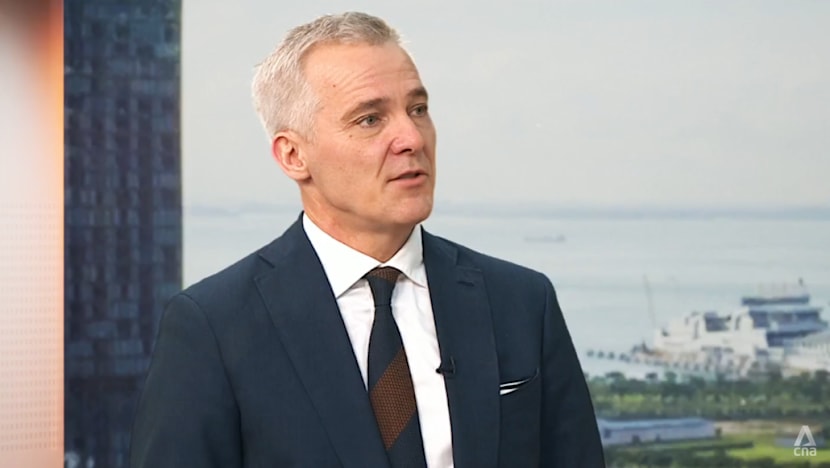Finland strengthens digital defences with AI and media literacy from young, says education minister
Already the most media-literate nation in Europe, Finland is doubling down on efforts in schools to combat misinformation in the artificial intelligence era.

Finland’s Minister of Education Anders Adlercreutz speaks during an interview with CNA.

This audio is generated by an AI tool.
SINGAPORE: As artificial intelligence becomes increasingly embedded in daily life and in classrooms, Finland is equipping its teachers and students with the skills needed to navigate an increasingly complex digital landscape.
Finland’s Minister of Education Anders Adlercreutz said societies must sharpen AI literacy and strengthen defences against misinformation, starting as early as preschool.
“(It’s important to) create the capacities for the children, the students, to know what AI is so that they can be responsible users,” Mr Adlercreutz told CNA on Friday (Nov 28).
“AI literacy is really close to media literacy in the sense that it's about discerning truth from falsehoods. It's about understanding how AI works (and) how that information is generated.”
Finland’s push is shaped not only by technological change but also by its geopolitical context.
The minister noted that Finland, like many European nations, faces “hybrid Russian pressure” in the online information space.
“At the moment, fake news is pouring in, trying to destabilise our societies. Look at the recent elections in Romania and Moldova – how Russia tried to sway those through disinformation,” he said.
The European Commission – the European Union’s main executive body – has since rolled out new initiatives to counter foreign information manipulation.
MEDIA LITERACY STARTS YOUNG
Finland is the most media-literate nation on the continent, topping the Organization for Security and Co-operation in Europe’s index for its success in teaching citizens to identify disinformation and fake news.
Media literacy is part of the national curriculum for both primary and secondary schools. Even preschoolers receive early exposure through experimentation and play.
From a young age, Finnish students are introduced to different types of media and learn how each medium works. They are taught to question content, examine sources and evaluate information critically.
“For upper secondary education, a high school student could (for example) set up a troll farm and try to sway his or her (classmates) into believing in something,” Mr Adlercreutz said.
“Through that, (they) understand how easily we are swayed, and how important it is to find the telltale signs to compare that information to other sources and so on.”
AI IN THE CLASSROOM
A recent Nordic survey found that nearly two-thirds of Finnish educators have some knowledge of AI tools, and about 8 per cent use them regularly for teaching. Most believe AI’s role in classrooms will continue to expand.
Mr Adlercreutz highlighted the growing responsibility schools face as generative AI tools like ChatGPT reshape how students learn, create and communicate.
Earlier this year, Finland issued general rules and ethical guidelines for its teachers on the use of AI in early childhood, primary and secondary education.
The minister also emphasised that Finland’s highly decentralised school system – where local municipalities and schools make many key decisions – enables rapid adaptation to new challenges.
This autonomy has helped make teaching a popular profession, with Finnish universities receiving more applicants than available places in education programmes, he added.
SAFE DIGITAL SPACES FOR CHILDREN
As other countries take steps to regulate children’s online activities – Australia has introduced a social media ban for under 16s from Dec 10, and Malaysia is considering similar measures – Finland is engaged in its own national debate.
“We’re trying to find a balance. We are not going back to the analogue world or jumping headfirst into the digital world,” Mr Adlercreutz said.
“We are trying to find adequate ways of taking advantage of both, so that our kids will be good and knowledgeable citizens.”
He noted that regulating digital access is technically difficult and requires greater accountability from platform providers.
Many countries, he added, are still struggling to find a safe space where children can coexist with the digital world without being harmed by it.
EDUCATION TIES WITH SINGAPORE
Mr Adlercreutz said education is a cornerstone of Finnish society. The sector receives the second-highest share of national social spending after healthcare.
While STEM (science, technology, engineering and mathematics) remains crucial, the minister stressed that skills like creativity and art matter more than ever, “especially in the age of AI, it's important that we also focus on things that make us really human”.
The minister said he is discussing AI adaptation and regulation with his Singapore counterparts during this visit.
He noted the close collaboration between Finland and Singapore in areas such as teacher training and AI usage. Singapore remains a popular destination for Finnish exchange students as well.
During his trip, which will end on Saturday, he is also visiting educational institutions and delivering a lecture on creativity and design in the era of AI at the National University of Singapore.















